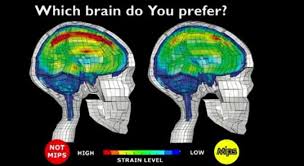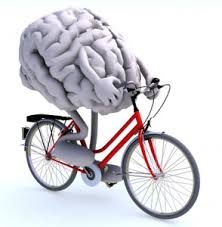Concussion Head Injuries in Mountain Bikers by David Musnick MD
Whether it’s falling off the back end, landing poorly, or taking that journey over your handlebars, there’s one question that should come to a mountain biker’s mind in a helmet-meets-object situation: do I have a concussion?
A Concussion is an injury to the head that is severe enough to cause residual symptoms. It’s important to try to prevent concussion—and really important to know how to improve brain healing afterwards.
Symptoms: The most common symptoms after a head injury are: tiredness, fatigue, headaches, irritability, problems with memory, organization, poor learning, and poor focus of attention.
Concussion: Your brain has connections called synapses and nerve cells called neurons. Having enough of these cells is critical for your memory, attention, and all brain functions—and we only have a limited amount., When your brain is compromised by numerous insults (damage to tissue)—the worst of which is a concussion—this can mean the loss of these neurons and synaptic connections.

Traumatic Brain Injury
What happens in the brain after a concussion is complex, but generally a rider will experience neural inflammation and damage from free radicals. If there is enough loss of brain cells and synapses, a person has a Traumatic Brain Injury. This is a more serious side effect of a concussion and needs to have a leading edge approach to slow the loss of brain cells and to improve function.
Concussion Prevention:
The best treatment for a concussion is prevention. Taking the necessary precautions to ride safely and effectively can mean avoiding an injury altogether.
Helmets: Make sure your helmet fits well, is the best one you can buy, and covers the base of your skull (if possible). Helmets with MIPS certification or outfitted with an additional piece of MIPS protection offer another safeguard by protecting against rotational force. In a recent review of helmets in Sweden the only helmets to get the highest ratings were MIPS certified helmets. Also, replace your helmet if it has been crashed.
Bike: The bike should be the right size and the best bike for the trail or features. If in doubt, bring your bike to a reputable local mountain bike store or ask an instructor at an Evergreen Mountain Bike Alliance class for advice.
Skills: Another important prevention is developing solid mountain bike skills. I recommend that everyone who wants to mountain bike take some lessons, as there are many bike skills that are not innate or natural. The worst injuries I have seen at Duthie came from people attempting jumps with very poor landing techniques (who had either inadequate bikes or have never taken lessons).
Group mountain bike lessons are available with Evergreen Mountain Bike Alliance. Private lessons are available thru Simon Lawton of Fluid Ride and Kat Sweet of Sweetlines.
If it happens…How is a concussion treated?
Most of the time there is no treatment recommended after a concussion (except for seeing a doctor and getting evaluated every few weeks). The problem with this approach is that there can be a loss of brain cells and a mild decrease in brain function that will not be treated or picked up by the average doctor. This can result in problems in school or work. Below is a more complete leading edge way to deal with concussion.
The first 8-10 weeks after the concussion is a critical period. It is important to get evaluated by a specialist that treats a lot of head injured patients. A number of other things are important.
1. Get a lot of sleep, at least 8--and more like 9-10—hours a day, and sleep in on weekends for the first 3-4 weeks.
2. Reduce stress, as stress increases Cortisol, and that can damage your memory.
3. Consider using certain supplements to decrease brain inflammation. One of these is Curcumin, particularly Longvida Curcumin, which is a form that is able to pass into the brain..
4. Take DHA fish oil to decrease brain inflammation
5. Eat a lot of blueberries
6. Consider an antioxidant that can decrease free radical damage in the brain like Alpha Lipoic acid
7. Consider getting treated with Frequency Specific Microcurrent that is a method to speed up brain healing without side effects
8. Avoid any contact sports in which your head could be reinjured—like soccer— until you have no symptoms
9. Start aerobic exercise 30-40 minutes a day to stimulate BDNF (Brain Derived Nerve Growth factor) to preserve and increase synaptic connections in your brain
10. Start using Lumosity.com to play brain games to stimulate new brain connections.
11. Get a functional test for concussion done.
12. The first night of the head injury make sure that you—or the injured person—is woken up every 4 hours and can talk normally to insure there is no evidence of a brain bleed. Also if there is a very severe headache or vomiting, go directly to the Emergency Room.
Summary
Remember your brain, your kids’ brains, and your friends’ brain is important. Do everything you can to prevent falling and concussions. Get the best medical attention and treatment to heal a concussion if you get one.
David Musnick MD
David’s biggest sport is mountain biking at Duthie and downhill biking at Whistler.
Sports Medicine Physician in Bellevue at www.peakmedicine.com (425) 462-7325
Dr. Musnick does comprehensive diagnosis, Low Level Laser Therapy, Frequency Specific Microcurrent and many leading edge treatments at his clinic for concussion and all types of injuries
Disclaimer: This article is for educational purposes only and is not a substitute for getting your head injury evaluated and treated by a Sports Medicine, Family Practice, Neurologist or Physiatrist Rehab Physician. Your outcome after a head injury is your responsibility and neither Dr Musnick nor Evergreen Mountain Bike alliance takes responsibility for your outcomes based on this article.
This is the first in a series of small articles on mountain bike injuries, how to prevent and treat them.

